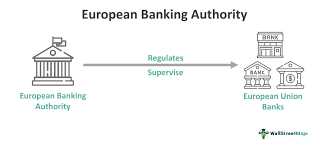European Banking Authority (EBA) Explained: A Comprehensive Guide
The European Banking Authority (EBA) is an independent regulatory agency that plays a crucial role in the European Union’s banking sector. Established in 2011, the EBA is responsible for ensuring the stability and integrity of the EU banking system, as well as promoting the transparency and efficiency of financial markets.
What is the European Banking Authority (EBA)?

The EBA is one of the three European Supervisory Authorities (ESAs) created in response to the financial crisis of 2008. Its main objective is to contribute to the establishment of a single rulebook for banking regulation across the EU, ensuring a level playing field for all financial institutions operating within the Union.
The EBA operates as an independent agency, with its own legal personality and budget. It is governed by a Board of Supervisors, consisting of representatives from national supervisory authorities and the European Commission. The Board is responsible for making decisions on regulatory and supervisory matters, as well as setting the strategic direction of the EBA.
Role and Responsibilities of the EBA
The EBA has a wide range of responsibilities aimed at ensuring the stability and integrity of the EU banking system. Its main tasks include:
- Developing technical standards and guidelines for the regulation and supervision of banks
- Conducting stress tests and risk assessments to identify potential vulnerabilities in the banking sector
- Coordinating the exchange of information and cooperation between national supervisory authorities
- Contributing to the development of EU-wide supervisory practices and standards
- Providing advice and recommendations to the European Commission on banking-related matters
By performing these tasks, the EBA aims to enhance the stability and resilience of the EU banking sector, protect depositors and investors, and promote the orderly functioning of financial markets.
Importance of the EBA in the Banking Sector
The EBA plays a crucial role in ensuring the soundness and stability of the EU banking sector. Its regulatory and supervisory activities help to prevent excessive risk-taking by banks, promote transparency and accountability, and safeguard the interests of depositors and investors.
Furthermore, the EBA’s role in developing technical standards and guidelines for banking regulation helps to harmonize the regulatory framework across the EU. This reduces regulatory arbitrage and ensures a level playing field for all financial institutions operating within the Union.
Overall, the EBA’s work contributes to the resilience and competitiveness of the EU banking sector, enhancing trust and confidence in the financial system.
Role and Responsibilities of the European Banking Authority (EBA)

The European Banking Authority (EBA) plays a crucial role in ensuring the stability and integrity of the European banking sector. As an independent regulatory body, the EBA is responsible for supervising and regulating banks and other financial institutions within the European Union (EU).
One of the main responsibilities of the EBA is to develop and maintain a single rulebook for banking regulation across the EU. This rulebook sets out the standards and guidelines that banks must adhere to in order to ensure the safety and soundness of the financial system. By harmonizing regulations and promoting consistent practices, the EBA helps to create a level playing field for banks operating in different EU member states.
The EBA also plays a key role in the supervision of banks. It conducts regular stress tests and risk assessments to identify potential vulnerabilities in the banking system and ensure that banks have adequate capital and liquidity buffers to withstand economic shocks. In addition, the EBA monitors and assesses the effectiveness of national supervisory authorities in their oversight of banks, promoting a high level of supervisory convergence across the EU.
Another important responsibility of the EBA is to promote consumer protection and transparency in the banking sector. It develops guidelines and recommendations to ensure that consumers are provided with clear and accurate information about financial products and services. The EBA also handles complaints from consumers regarding cross-border banking activities and works to resolve disputes between consumers and banks.
The EBA also plays a role in the resolution of failing banks. It provides technical expertise and guidance to national resolution authorities in the development and implementation of resolution plans for banks that are no longer viable. The EBA’s aim is to ensure that the resolution of failing banks is carried out in an orderly manner, minimizing the impact on financial stability and protecting depositors and taxpayers.
Importance of the European Banking Authority (EBA) in the Banking Sector
One of the key reasons why the EBA is important in the banking sector is its role in enhancing financial stability. The EBA conducts stress tests and risk assessments on banks operating within the EU to identify any vulnerabilities and potential risks to the stability of the financial system. By doing so, the EBA helps prevent financial crises and ensures that banks have sufficient capital and liquidity to withstand adverse economic conditions.
Furthermore, the EBA plays a vital role in promoting consumer protection in the banking sector. It develops and enforces regulations that aim to safeguard the interests of consumers, such as ensuring fair and transparent pricing, promoting responsible lending practices, and protecting consumers’ deposits. This helps build trust and confidence in the banking system, which is essential for its smooth functioning.
The EBA also contributes to the harmonization of banking regulations across the EU. It works closely with national supervisory authorities to develop common standards and guidelines that ensure a level playing field for all banks operating within the EU. This harmonization not only reduces regulatory arbitrage but also facilitates cross-border banking activities and enhances the efficiency of the banking sector.
Additionally, the EBA plays a crucial role in crisis management and resolution. In the event of a bank failure or financial distress, the EBA provides guidance and support to national authorities in resolving the crisis and minimizing the impact on the financial system. Its expertise and coordination efforts are instrumental in maintaining financial stability and preventing contagion effects.

Emily Bibb simplifies finance through bestselling books and articles, bridging complex concepts for everyday understanding. Engaging audiences via social media, she shares insights for financial success. Active in seminars and philanthropy, Bibb aims to create a more financially informed society, driven by her passion for empowering others.
